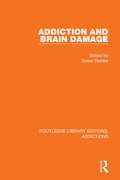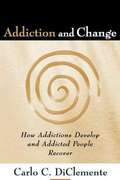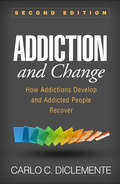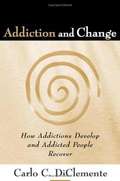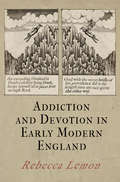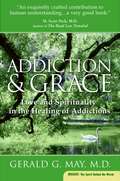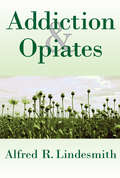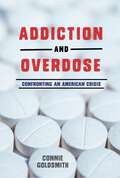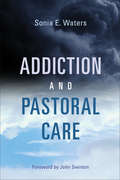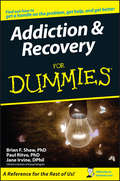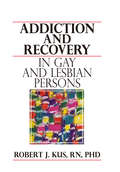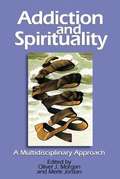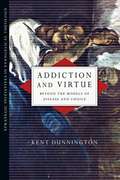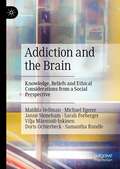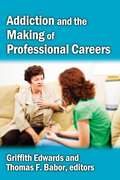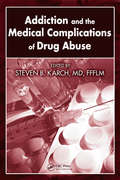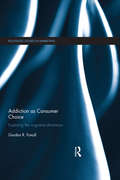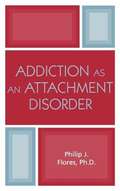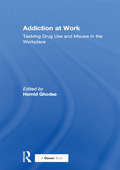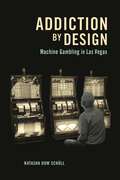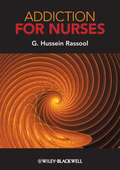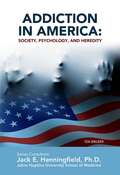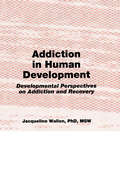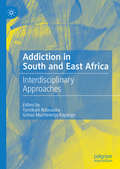- Table View
- List View
Addiction and Brain Damage (Routledge Library Editions: Addictions #3)
by Derek RichterOriginally published in 1980, recent research had produced new insights into how, at the biochemical level, alcohol and other drugs of abuse can impair metabolic and neuropsychiatric functions. Epidemiological studies were also demonstrating that even moderate drinking or drug abuse can produce significant brain damage. This book draws together the latest biochemical, physiological and clinical research on these topics at the time. The initial chapters discuss how alcohol can interfere with various functions: the adaptability of metabolic processes as governed by the ability of the liver to synthesise new enzymes, cell membrane transport, nervous transmission and the transport of nutrients into the brain. It is suggested that opiates, and possibly alcohol, may affect the endorphin system by blocking the uptake of specific amino acids. The second half of the book reports clinical investigations using biochemical studies, psychological tests, EEG investigations and Computerised Axial Tomography (CAT) scanning. It gives the first report of a long-term study by Lishman and co-workers using an improved tomography technique to assess brain damage in alcoholics. These studies give convincing evidence that heavy drinking, even at socially-acceptable levels, can cause serious brain damage in vulnerable people.
Addiction and Change
by Carlo DiclementeThe stages-of-change model has become widely known as a framework for conceptualizing recovery. Less well known are the processes that drive movement through the stages or how the stages apply to becoming addicted. From Carlo C. DiClemente, codeveloper of the transtheoretical model, this book offers a panoramic view of the entire continuum of addictive behavior change. The author illuminates the common path that individuals travel as they establish and reinforce new patterns of behavior, whether they are developing an addiction or struggling to free themselves from one, and regardless of the specific addictive behavior. The book addresses crucial questions of why, when, and how to intervene to bolster recovery in those already addicted and reach out effectively to people at risk.
Addiction and Change, Second Edition: How Addictions Develop and Addicted People Recover
by Carlo C. DiClementeNot everyone who experiments with substance use or risky behavior becomes addicted, and many who are addicted have been able to recover. This authoritative book, now revised and updated, has given tens of thousands of professionals and students a state-of-the-art framework for understanding the journey both into and out of addiction. From Carlo C. DiClemente, codeveloper of the transtheoretical model (TTM), the book identifies the stages and processes involved in initiating, modifying, maintaining, or stopping any pattern of behavior. Grounded in extensive research, and illustrated with vivid case examples, the book shows how using the TTM can help overcome obstacles to change and make treatment and prevention more effective. New to This Edition *Incorporates 15 years of research advances, contemporary prevention and treatment approaches, and the ongoing development of the TTM. *Chapter on current developments in intervention research. *Expanded discussions of neuroscience; self-regulation; behavioral economics; self-help, mutual help, and spirituality; motivational issues; "process addictions" (gambling and sex addiction); and more. *Deeper coverage of risk and protective factors across adolescent and young adult development.
Addiction and Change: How Addictions Develop and Addicted People Recover
by Carlo C. DiclementeDiClemente (psychology, University of Maryland) views addiction as a process of intentional behavior change, and defines the four steps in his transtheoretical model: contemplation, preparation, action, and maintenance. He then proposes that the same process marks the path to addiction as it does for recovery, and suggest ways to tailor interventions to persons at different points in the change process. Annotation (c)2003 Book News, Inc., Portland, OR (booknews.com)
Addiction and Devotion in Early Modern England (Haney Foundation Series)
by Rebecca LemonRebecca Lemon illuminates a previously-buried conception of addiction, as a form of devotion at once laudable, difficult, and extraordinary, that has been concealed by the persistent modern link of addiction to pathology. Surveying sixteenth-century invocations, she reveals how early moderns might consider themselves addicted to study, friendship, love, or God. However, she also uncovers their understanding of addiction as a form of compulsion that resonates with modern scientific definitions. Specifically, early modern medical tracts, legal rulings, and religious polemic stressed the dangers of addiction to alcohol in terms of disease, compulsion, and enslavement. Yet the relationship between these two understandings of addiction was not simply oppositional, for what unites these discourses is a shared emphasis on addiction as the overthrow of the will.Etymologically, "addiction" is a verbal contract or a pledge, and even as sixteenth-century audiences actively embraced addiction to God and love, writers warned against commitment to improper forms of addiction, and the term became increasingly associated with disease and tyranny. Examining canonical texts including Doctor Faustus, Twelfth Night, Henry IV, and Othello alongside theological, medical, imaginative, and legal writings, Lemon traces the variety of early modern addictive attachments. Although contemporary notions of addiction seem to bear little resemblance to its initial meanings, Lemon argues that the early modern period's understanding of addiction is relevant to our modern conceptions of, and debates about, the phenomenon.
Addiction and Grace: Love and Spirituality in the Healing of Addictions (Leader's Guide Ser.)
by Gerald G. MayAddiction and Grace offers an inspiring and hope-filled vision for those who desire to explore the mystery of who and what they really are.<P><P> May examines the "processes of attachment" that lead to addiction and describes the relationship between addiction and spiritual awareness. He also details the various addictions from which we can suffer, not only to substances like alcohol and drugs, but to work, sex, performance, responsibility, and intimacy. Drawing on his experience as a psychiatrist working with the chemically dependent, May emphasizes that addiction represents an attempt to assert complete control over our lives. Addiction and Grace is a compassionate and wise treatment of a topic of major concern in these most addictive of times, one that can provide a critical yet hopeful guide to a place of freedom based on contemplative spirituality.
Addiction and Opiates
by Alfred R. LindesmithThis classic study is concerned with addiction to opiate-type drugs and their synthetic equivalents. Lindesmith proposes and systematically elaborates a rational, general theoretical account of the nature of the experiences which generate the addict's characteristic craving for drugs. While this theoretical position has obvious implications for addictions that resemble opiate addiction in that they also involve drugs which produce physical dependence and withdrawal distress, the author does not extend the theory to these other forms of addiction, such as alcoholism.The central theoretical problem is posed by the fact that some persons who experience the effects of opiate-type drugs and use them for a period sufficient to establish physical dependence do not become addicts, while others under what appear to be the same conditions do become addicted. The focus of theoretical attention is on those aspects of addiction which may reasonably he regarded as basic or essential in the sense that they are invariably manifested by all types of addicts regardless of place, time, method of use, social class, and other similar variable circumstances. Lindesmith then makes a brief statement of a view of current public policy concerning addiction in the United States reform which, it is believed, would substantially reduce the evils now associated with addiction and the large illicit traffic in drugs. He interviews approximately fifty addicts over a fairly extended period of time sufficient to establish an informal, friendly relationship of mutual trust.The attempt to account for the differential reactions among drug users requires specification of the circumstances under which physical dependence results in addiction and in the absence of which it does not. It also requires careful consideration of the meaning of "addiction," spelled out in terms of behavior and attitudes characteristic of opiate addicts everywhere. This book strives to understand these aspects of addiction with t
Addiction and Overdose: Confronting an American Crisis
by Connie GoldsmithDrug overdosing and death from prescription painkillers and heroin are at epidemic levels in the United States. How do people become addicted to opioids and other dangerous drugs, and why? Meet the experts who study the neurology of addiction. Hear stories of addicts in recovery, and of loved ones left behind by those who died from overdosing. Discover more about the social and economic costs of overdosing and learn about scientific research to decrease it. Learn about the connection between addiction and mental health disorders. Find out how to identify signs of addiction and overdose and what you can do to help someone get assistance.
Addiction and Pastoral Care
by John Swinton Sonia E. WatersA timely resource treating addiction holistically as both a spiritual and a pathological conditionSubstance addictions present a unique set of challenges for pastoral care. In this book Sonia Waters weaves together personal stories, research, and theological reflection to offer helpful tools for ministers, counselors, chaplains, and anyone else called to care pastorally for those struggling with addiction.Waters uses the story of the Gerasene demoniac in Mark’s Gospel to reframe addiction as a “soul-sickness” that arises from a legion of individual and social vulnerabilities. She includes pastoral reflections on oppression, the War on Drugs, trauma, guilt, discipleship, and identity. The final chapters focus on practical-care skills that address the challenges of recovery, especially ambivalence and resistance to change.
Addiction and Pastoral Care
by Sonia E. WatersA timely resource treating addiction holistically as both a spiritual and a pathological conditionSubstance addictions present a unique set of challenges for pastoral care. In this book Sonia Waters weaves together personal stories, research, and theological reflection to offer helpful tools for ministers, counselors, chaplains, and anyone else called to care pastorally for those struggling with addiction.Waters uses the story of the Gerasene demoniac in Mark&’s Gospel to reframe addiction as a &“soul-sickness&” that arises from a legion of individual and social vulnerabilities. She includes pastoral reflections on oppression, the War on Drugs, trauma, guilt, discipleship, and identity. The final chapters focus on practical-care skills that address the challenges of recovery, especially ambivalence and resistance to change.
Addiction and Recovery For Dummies
by Brian F. Shaw Paul Ritvo Jane Irvine D. Phil M. David LewisEvaluate medications and treatment programs Break free from addictive substances or behaviors and get a fresh start Think you have an addiction? This compassionate guide helps you identify the problem and work towards a healthy, realistic approach to recovery, explaining the latest clinical and self-help treatments for both adults and teens. This book also offers tips on reducing cravings, handling your relationships, and staying well for the long run. Discover how to * Identify the reasons for addiction * Choose the best treatment plan * Handle slips and relapses * Detect addictions in a loved one * Find help and support
Addiction and Recovery in Gay and Lesbian Persons
by Robert J KusThis book provides chemical dependency clinicians a sampling of the work being done in the fields of gay and lesbian chemical dependency to enable clinicians to provide better care for their gay and lesbian clients.After an overview of 7 research studies which examine the incidence of alcoholism and/or chemical dependency in gay and lesbian persons, the contributing authors explore the special concerns of recovering gay and lesbian addicts.Chapters focus not only on issues in the fields of gay and lesbian chemical dependency but how clinicians can use this knowledge to better care for their gay and lesbian clients. Readers will find new information on: working with HIV positive persons homophobia as a critical root in chemically dependent gays and lesbians positive changes for dysfunctional relationships common with gays and lesbians spirituality in gay and lesbian communities the special needs of the rural gay/lesbian client gay men&’s groups in AA a retrospective of NALGAP resources and referrals for chemically dependent gay and lesbian personsAddiction and Recovery in Gay and Lesbian Persons assists social workers and other helping professionals working with chemically dependent clients learn more about how to adequately treat them. Gay and lesbian persons recovering from a chemical addiction will also find this book enlightening.
Addiction and Spirituality
by Oliver J. Morgan Merle R. JordanReligious and secular counselors from a variety of disciplines share their basic approaches in working with addicted persons and their understandings of the spiritual dimension in treatment and recovery.
Addiction and Virtue: Beyond the Models of Disease and Choice
by Kent J. DunningtonWhat is addiction? Neither of the current dominant models (disease or choice) adequately accounts for the experience of those who are addicted or of those who are seeking to help them.
Addiction and the Brain: Knowledge, Beliefs and Ethical Considerations from a Social Perspective
by Michael Egerer Matilda Hellman Janne Stoneham Sarah Forberger Vilja Männistö-Inkinen Doris Ochterbeck Samantha RundleThis book investigates the neuroscientific knowledge on addiction as an epistemic project.
Addiction and the Making of Professional Careers
by Griffith EdwardsThe misuse of drugs continues to cause suffering and worldwide economic turmoil. In response to these problems, many have devoted their lives to preventing the misuse of mind-altering substances. Addiction and the Making of Professional Careers focuses on the need for enhanced understanding of professional careers in the addiction field. The spectrum of professionals involved is wide and includes treatment personnel of every kind. Some of the questions examined here include: Why do some people decide to dedicate their lives to responding to drug problems? How do and should we select, train, mentor, support, inspire, and nurture the young career aspirant? What makes for the most effective use of talent? Is every personal case different or can general conclusions be reached? After a foreword by William Miller and an introduction by Griffith Edwards, the book includes interviews with Joseph Brady, Louis Harris, Conan Kornetsky, and Robert DuPont, all of whom were pioneers in the behavioral pharmacological analysis of addiction. Commentary chapters are written by Kerstin Stenius, Ilana Crome, Peter Anderson, and Jonathan Chick.
Addiction and the Medical Complications of Drug Abuse
by Steven B. KarchExtracted from the Drug Abuse Handbook, 2nd edition, to give you just the information you need at an affordable price.Addiction and the Medical Complications of Drug Abuse explores the physiological and psychological phenomenon of addiction including the nature of dependence, the dependence potential of drugs, and the i
Addiction as Consumer Choice: Exploring the Cognitive Dimension (Routledge Studies in Marketing)
by Gordon FoxallA striking characteristic of addictive behavior is the pursuit of immediate reward at the risk of longer-term detrimental outcomes. It is typically accompanied by the expression of a strong desire to cease from or at least control consumption that has such consequences, followed by lapse, further resolution, relapse, and so on. Understood in this way, addiction includes substance abuse as well as behavioral compulsions like excessive gambling or even uncontrollable shopping. Behavioral economics and neurophysiology provide well-worn paths to understanding this behavior and this book regards them as central components of this quest. However, the specific question it seeks to answer is, What part does cognition – the desires we pursue and the beliefs we have about how to accomplish them – play in explaining addictive behavior? The answer is sought in a methodology that indicates why and where cognitive explanation is necessary, the form it should take, and the outcomes of employing it to understand addiction. It applies the Behavioral Perspective Model (BPM) of consumer choice, a tried and tested theory of more routine consumption, ranging from everyday product and brand choice, through credit purchasing and environmental despoliation, to the more extreme aspects of consumption represented by compulsion and addiction. The book will advance debate among behavioral scientists, cognitive psychologists, and other professionals about the nature of economic and social behavior.
Addiction as an Attachment Disorder
by Philip J. FloresFrom the Foreword: "Addiction is a disorder in self-regulation. Individuals who become dependent on addictive substances cannot regulate their emotions, self-care, self-esteem, and relationships. In this monumental and illuminating text Philip Flores covers all the reasons why this is so. But it is the domain of interpersonal relations that he makes clear why individuals susceptible to substance use disorders (SUDs) are especially vulnerable. His emphasis on addiction as an attachment disorder is principally important because he provides extensive scholarly and clinical insights as to why certain vulnerable individuals so desperately need to substitute chemical solutions and connections for human ones. The strength of Flores's paradigm of addiction as an attachment disorder is that it is a theory that effectively and wisely guides treatment, but at the same time, when properly implemented or practiced, the treatment resonates with and further enhances the theory. Flores's work here is an extraordinary one because, in parsimonious and clear language, he makes a major contribution to the literature and practice of effective psychotherapy in general and effective psychotherapy for the addictions in particular. He fills in all the gaps between theory and practice covering wide and ranging issues of what practice and empirical findings have to teach about the critical ingredients of AA, group therapy, and individual psychotherapy. This is a job well done because it helps students and experienced clinicians alike to always be mindful of how they bring their humanity to the distress and suffering of others. His theory of addiction as an attachment disorder makes it particularly clear how especially important this is for those suffering with addictive disorders. " —Edward J. Khantzian, M.D., clinical professor of psychiatry, Harvard Medical School
Addiction at Work: Tackling Drug Use and Misuse in the Workplace
by Hamid GhodseDrugs and the workplace just don't mix. Yes, most users of illicit drugs are employed adults and there's a high correlation between levels of stress, income and alcohol abuse amongst professional and managerial employees. But the risks associated with drug use and abuse in the workplace have been well defined. Addiction at Work enables you to understand the background and extent of the problem: the cost of drug abuse to your organization; the role your own organizational culture may have in encouraging drug misuse; the risks associated with dangerous or stressful jobs. There are also chapters to help you understand the symptoms of drug abuse and the potential risks associated with perfectly legal prescription or over-the-counter medicines. The right kind of drug policy can be a significant weapon to fight this problem. So Addiction at Work explores your responsibility as an employer and how to design, communicate and implement a policy that is appropriate for your organization. Finally, there are chapters on the tools and techniques open to your organization for tackling the problem head on; ways of addressing problem behaviours; the advantages and disadvantages of drug screening and the ethics associated with this practice; employee assistance programmes and specialist care and, finally, the employment law issues around drugs. Addiction at Work has been written by some of the world-authorities on drug use in the workplace. It is an essential reference for organizations seeking a way through the human, ethical and legal issues (and the risk they present to any employer) of a social problem that is increasingly impacting employees whatever their work or the nature of their workplace.
Addiction by Design: Machine Gambling in Las Vegas
by Natasha Dow SchüllAn anthropologist looks at the new "crack cocaine" of high-tech gamblingRecent decades have seen a dramatic shift away from social forms of gambling played around roulette wheels and card tables to solitary gambling at electronic terminals. Slot machines, revamped by ever more compelling digital and video technology, have unseated traditional casino games as the gambling industry's revenue mainstay. Addiction by Design takes readers into the intriguing world of machine gambling, an increasingly popular and absorbing form of play that blurs the line between human and machine, compulsion and control, risk and reward.Drawing on fifteen years of field research in Las Vegas, anthropologist Natasha Dow Schüll shows how the mechanical rhythm of electronic gambling pulls players into a trancelike state they call the "machine zone," in which daily worries, social demands, and even bodily awareness fade away. Once in the zone, gambling addicts play not to win but simply to keep playing, for as long as possible—even at the cost of physical and economic exhaustion. In continuous machine play, gamblers seek to lose themselves while the gambling industry seeks profit. Schüll describes the strategic calculations behind game algorithms and machine ergonomics, casino architecture and "ambience management," player tracking and cash access systems—all designed to meet the market's desire for maximum "time on device." Her account moves from casino floors into gamblers' everyday lives, from gambling industry conventions and Gamblers Anonymous meetings to regulatory debates over whether addiction to gambling machines stems from the consumer, the product, or the interplay between the two.Addiction by Design is a compelling inquiry into the intensifying traffic between people and machines of chance, offering clues to some of the broader anxieties and predicaments of contemporary life. At stake in Schüll's account of the intensifying traffic between people and machines of chance is a blurring of the line between design and experience, profit and loss, control and compulsion.
Addiction for Nurses
by G. Hussein RassoolNurses are acknowledged as key agents in addressing alcohol and drug misuse at individual, family, and community levels. Addiction nursing is central to the assessment, management, and care of people with problematic use of psychoactive substances (both legal and illegal). Work takes place in a wide range of settings, from traditional hospital clinics and wards to community locations such as police custody suites and needle exchange facilities. Addiction for Nurses is a comprehensive textbook for students, explaining the role of the nurse at each stage of intervention. Early chapters approach the subject from sociological, historical, and cultural perspectives, covering significant topics such as the nature of addiction, its social context, and addiction theory. The book then presents vital information about each of the main areas of addiction (nicotine, alcohol, opiates, cannabis, psychostimulants, and hallucinogens) with clinical and practical guidance on recognition, assessment, and treatment intervention strategies. Further chapters consider dealing with emergencies, blood-borne viruses, harm reduction, and work with specific client groups (for instance, black and ethnic minority communities, or those with special needs). This book is an essential resource for all those who come into contact with alcohol and drug misusers and for specialist addiction nurses preparing for practice in this complex and rewarding field.
Addiction in America: Society, Psychology, and Heredity (Illicit and Misused Drugs)
by Ida WalkerAlmost 40 percent of people living in the United States have an addiction to alcohol, drugs, or some form of tobacco. These addictions cost Americans hundreds of billions of dollars every year. Clearly, addiction is an enormous problem. Addiction in America: Society, Psychology, and Heredity takes a look at what leads people to a life of addiction--the social, psychological, and hereditary factors that might make an individual susceptible to addiction. This book provides you with an overview of one of the most serious problems facing American society today.
Addiction in Human Development: Developmental Perspectives on Addiction and Recovery
by Bruce Carruth Jacqueline WallenFind fresh perspectives on the treatment of addictions and effective methods for helping recovering alcohol and drug abusers in this valuable book!Addiction in Human Development provides practical strategies based on theories of human development for working with clients recovering from alcoholism and drug addiction. An understanding of these theories will help therapists and addictions counselors recognize stages of recovery and better select appropriate interventions for every phase of treatment of addicted clients.Addiction in Human Development shows how a developmental perspective is particularly appropriate to the treatment of alcohol and substance abusers and the patterns involved in their addiction. Disruptions in clients’childhood or adolescent development, stemming from their own or a parent’s drug abuse, can influence their present recovery process. This informative book also describes the developmental course of addiction and provides tools designed to interrupt addictive patterns. In addition, stages in the developmental process of recovery are identified to help therapists select appropriate interventions.Some of the topics related to human development and addiction covered in this insightful volume include developmental deficits and developmental arrest in recovering clients, delayed reactions to sexual abuse and other childhood trauma, stages in recovery from alcoholism or drug addiction, developmental issues in the professional’s own life, and multi-problem families with a multigenerational history of substance abuse. Applying these developmental strategies to work with addicted individuals will significantly improve communication and rapport between helping professionals and recovering addicts and lead to more success in alcohol and drug addiction therapy.
Addiction in South and East Africa: Interdisciplinary Approaches
by Grivas Muchineripi Kayange Yamikani NdasaukaThis book explores both the existence and prevalence of addiction in South and East Africa, departing from traditional assumptions about addiction in the region. The authors employ an interdisciplinary approach to understand the actual prevalence of addiction and the forms it takes in South and East Africa. The book also addresses the perceptions and conceptualisation of addiction in the region, in addition to discussing specific issues related to drug and alcohol abuse and addiction, social media addiction, and sex addiction.
